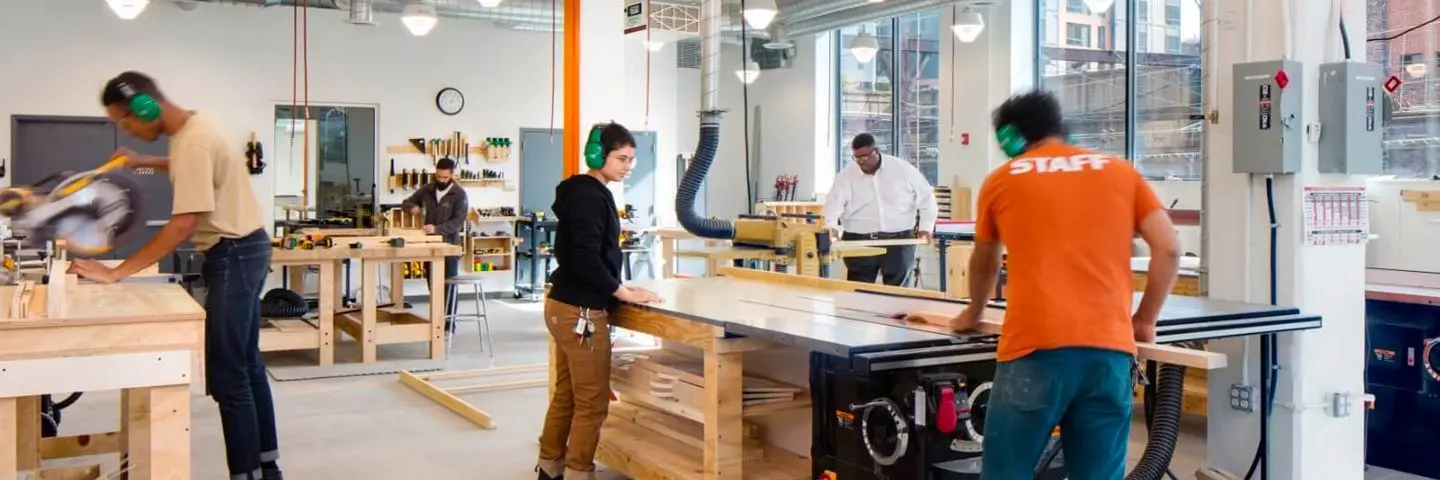New program seeks to expand makerspaces across the state
08/15/2022| Daniel Leaderman
New program seeks to expand makerspaces across the state
08/15/2022 | Daniel Leaderman
“Makerspaces” can be many things at once: part classroom, part community center, part art studio, part workshop where hobbyists can tinker, even part business incubator and co-working space. They can also be a powerful tool for economic growth, community revitalization, creating jobs, and developing the state’s manufacturing workforce.
Now, there is a new program at TEDCO to boost both the number and the impact of makerspaces across Maryland. The Maryland Makerspace Initiative Program , created by the Maryland General Assembly earlier this year, will provide grants to support the expansion and establishment of makerspaces by organizations and local governments across Maryland.
“This really positions Maryland at the top for supporting the development of makerspaces,” said Dorothy Jones-Davis, executive director of Nation of Makers , a national nonprofit focused on providing support and advocacy for the maker ecosystem.
Maryland seems to be the first state in the country to establish such a program, which is designed to foster a community of makerspaces rather than a single facility. This can make Maryland a model for other states looking to grow their maker ecosystems, Jones-Davis said.
A particular benefit of the enabling legislation behind the new program is that it offers a definition of makerspace that should help people understand the value of such facilities, Jones-Davis said.
Facilities like the nonprofit Open Works in Baltimore, which served as a model for the new program, provide access to a range of tools and technology – including table saws, sewing machines, welders, laser cutters and 3D printers – and offer a variety of classes and programs.
Amateurs and DIY enthusiasts might use a makerspace to sharpen their skills before taking on a new project; entrepreneurs, startups, and small businesses might use the facility for product design and prototyping; artists could use shared studio space. Open Works has even partnered with Baltimore City on a two-year apprenticeship program to train industrial sewing machine operators.
But Jones-Davis notes that makerspaces exist on a spectrum. Some may be more tailored to hobbyists and amateurs, some may be more industrial to meet the needs of local businesses.
“There’s no one-size fits all model,” Jones-Davis said. “These spaces are multifaceted and are uniquely able to fill different needs of communities.”
Will Holman, executive director of Open Works, who was a key supporter of the enabling legislation that created the new program, notes that makerspaces can play a unique role in supporting the growth of small businesses in their communities.
“We tend to think of economic development as top-down: big projects with major infrastructure investment and a lot of construction jobs,” Holman said in an interview. Makerspaces, however, can be an invaluable resource for smaller enterprises and individuals who are starting out with little more than an idea — or “one person with a dream,” Holman said.
Since 2016, 211 small businesses have used Open Works resources to create 118 jobs and generate nearly $10 million in annual economic output, according to Holman.
The community was also able to quickly mobilize and pitch in during the early, hectic days of the COVID-19 pandemic: in March 2020, Open Works organized a network of 388 volunteers from across the state to produce nearly 30,000 units of much-needed personal protective equipment while supply chains were strained . The following year, volunteers produced 863 plywood desks for Baltimore City students to use during remote learning, according to Holman.
A robust community of makerspaces would amplify the achievements of facilities like Open Works.
In 2019 alone, Open Works provided technical education classes to 1,339 adults and 171 youth; a network of five locations, for example, could provide that level of training to thousands of people across the state, produce $45 million in annual economic impact, and generate $2.25 million in annual tax revenues. It would also create hundreds of new jobs both directly and through the growth of new startup companies, Holman wrote to Maryland lawmakers in his testimony supporting the legislation.
“My personal hope is for a facility on the scale of Open Works in every county in the state,” Holman said. These facilities would be tailored to the needs of their respective counties, but “share DNA” regarding the curriculum and tools, so skills learned in Talbot County, for example, could easily be transferred to Baltimore City or elsewhere, Holman said.
This network would help meet a growing need for technical education and skills, he said. “This is how we’re going to grow economically, as a state.”
Keep up with the latest.
Sign up for e-mail notifications.
